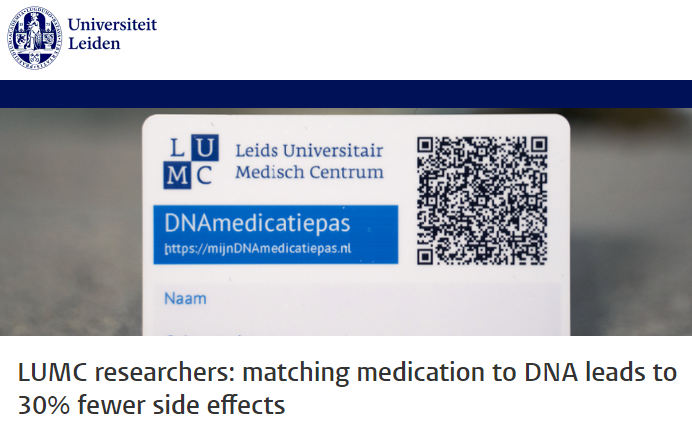






Meamedica personal medicine
The meamedica personal medicine test is a drug response test, but more commonly known as a pharmacogenetic test.
A pharmacogenetic test determines the activity of genes involved in drug processing, both in metabolism and transport within the body.
With these results you, as a healthcare provider, can make better informed decisions about a drug therapy and the associated dose/strength.
Influence of genes on medication of certain disorders
Depression and anxiety
More than one million people use an antidepressant, while about 30 to 50% of them do not work well enough.
The search for the right drug in the right dose can take months. During that time, the side effects are often intense, which seriously damages confidence in oneself, in the doctor and in a treatment.
Do you have patients who have problems finding the right medicine for a depression or anxiety disorder?
The pharmacogenetic test can help with this. By determining the activity of the genes that process medicines, it is possible to assess for each medicine whether and under what dosages the medicine fits the gene profile.
Psychosis
High bloodpressure
High cholesterol
More than one million people use an antidepressant, while about 30 to 50% of them do not work well enough.
The search for the right drug in the right dose can take months. During that time, the side effects are often intense, which seriously damages confidence in oneself, in the doctor and in a treatment.
Do you have patients who have problems finding the right medicine for a depression or anxiety disorder?
The pharmacogenetic test can help with this. By determining the activity of the genes that process medicines, it is possible to assess for each medicine whether and under what dosages the medicine fits the gene profile.
Medications are usually an important part of the treatment of psychosis. These drugs are called 'antipsychotics'. They affect the functioning of nerve cells in the brain.
Antipsychotics help to get out of psychosis. Antipsychotics have no curative effect; they do not remove the cause of the psychosis or solve underlying problems. The medication ensures that anxiety and agitation are dampened. This can help a patient regain control over life.
Antipsychotics often come with many side effects and it can often take a long time before it is clear whether they also help against the psychotic symptoms.
Do you have patients who have problems finding the right medication for a psychiatric disorder?
The pharmacogenetic test can help with this. By determining the activity of the genes that process medicines, it is possible to assess for each medicine whether and under what dosages the medicine fits the gene profile.
High blood pressure is a major cause of cardiovascular disease, heart failure, stroke, kidney problems and brain damage. In addition to factors such as diet and smoking, blood pressure is largely (30-60 percent) determined by hereditary predisposition. There are different types of medications to lower blood pressure. Often more than one type is prescribed. This often gives better responses with less risk of side effects. Unfortunately, only a small number of patients with hypertension manage blood pressure with appropriate drug therapy. An investigation into differences in DNA can then be used as a tool to arrive at a better treatment of blood pressure.
Statins are indicated for the prevention of cardiovascular disease and are among the most commonly prescribed classes of medication. However, not all patients respond favorably to statins, and some do not reach their cholesterol-lowering goals. In addition, a significant number of patients experience adverse effects. Inflammation in the muscles, muscle weakness and liver abnormalities are the most commonly reported side effects of statins, often leading to poor compliance or discontinuation of the statin. A pharmacogenetic test, such as the meamedica personal medicine test, can provide an opportunity for the patient to weigh the possible benefits against the possible risks of a statin together with his practitioner. The choice of a statin and its dosage can thus be adapted to the DNA profile.
Antidepressants
The Cytochrome P450 system is responsible for the metabolism of approximately 90% of commonly prescribed drugs. The CYP genes contain many genetic variants that can give both increased and decreased enzyme activity. Genotyping can help with the choice (& dosage) of the medication. Dosage guidelines are available for a number of antidepressants.
Cholesterol reducers
By a lower activity of certain enzymes, statins (simvastatin, ...) can be removed too slowly from the body. Then the medicine accumulates and that can explain severe side effects. See at a glance whether it is better to avoid statins for your patient.
Surgeries
In people with inactive variants of the BCHE gene, muscle relaxants, which are used in emergency situations (operations), can last too long making independent breathing only possible later. A dose adjustment resolves this.
Blood Clotting
This test determines how your blood clotting is controlled. Both genes F2 and F5 (Factor V Leiden) are analysed, in addition to genes that influence the availability of Vitamin K in the coagulation cascade.
In the news
 The statement 'one size does fit all' has not been sufficient for the medicinal treatment of patients for some time now.
The statement 'one size does fit all' has not been sufficient for the medicinal treatment of patients for some time now.A targeted approach and the pharmacist's professional assessment of potential pharmacogenetics-related medication problems lead to a medication or dose adjustment in approximately 30% of patients.



